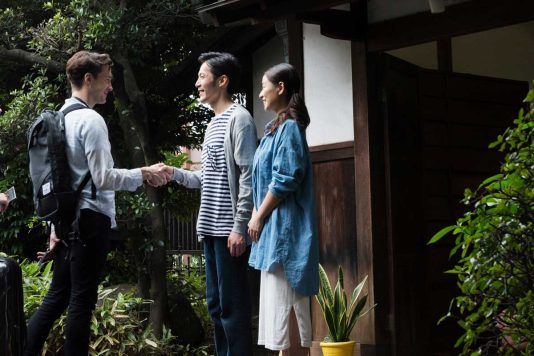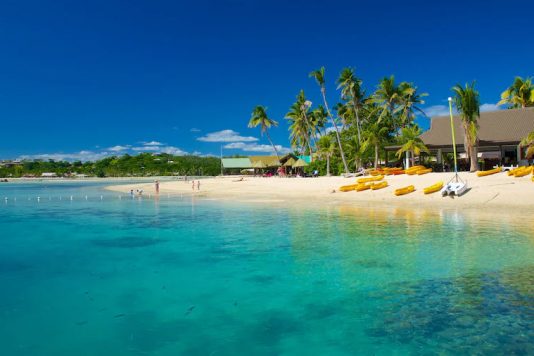January 17, 2022
During our sustainability webinar last fall, we led a discussion with Peter DeBrine, Destination Advisor at UNESCO, and Dr. Megan Morikawa, Global Director of Sustainability Office at Iberostar Group, to discuss the emergence of sustainable travel and best practices on how to inspire and engage travelers during this critical rebuilding period, while also promoting sustainable tourism efforts.
Here we sit down with Dr. Megan Morikawa to learn more about Iberostar Group’s various initiatives to promote sustainable and regenerative tourism, and hear some tips for travel brands on implementing sustainable travel efforts.
Q: How is Iberostar promoting sustainable and regenerative tourism?
A: At Iberostar, we have a strong commitment to the oceans and the local communities where we operate. With 80% of our properties located by the coasts, we are experiencing firsthand some of the most detrimental environmental effects that are impacting our business, including hurricanes, loss of biodiversity, pollution, and more.
As a result, we started our Wave of Change movement in 2017 to show our commitment to the oceans and leading responsible tourism. Our Wave of Change movement is built on three main pillars of action: commitment to a circular economy, the responsible consumption of seafood, and coastal health. With each of these pillars, we’ve devised quantitative, science-driven, and time-bound goals to ensure we’re making tangible progress with our initiatives. For example, as part of our Wave of Change movement, we’ve committed to becoming carbon neutral by 2030. We know this is a hefty goal, so we’ve also committed to offsetting at least 75% of any remaining emissions by investing in the restoration and improvement of our physical surroundings, including restoring trees, mangroves, and other ecosystems surrounding our properties.
We are currently working with the Dominican Republic’s Ministry of Environment to co-manage one of its precious habitats and help restore and preserve its mangrove ecosystem. We’re also excited to be partnering with Expedia Group on the Protecting and Restoring the Mesoamerican Reef Project and the positive impact this unique collaboration will have.
Q: How has the pandemic changed Iberostar’s sustainable tourism initiatives?
A: As your data indicates, travelers are increasingly becoming aware of sustainable travel choices and are expecting brands to be more environmentally responsible. That said, sustainable travel has always been an integral part of Iberostar’s DNA, though the pandemic and the heightened attention on sustainable tourism have certainly emphasized the importance of these ongoing efforts. We’ve learned that cooperation and collaboration throughout one’s organization is invaluable in bringing these issues to the executive level for serious change to occur, and we’re fortunate that these shared values across the organization continue to drive Iberostar’s commitment to leading responsible tourism.
Q: How can travel brands drive sustainable travel efforts within their organization?
A: First and foremost, it’s important that values on sustainability are shared throughout the organization, including with leadership, to ensure actions are made. There are many facets of sustainable tourism that businesses can get involved with, whether that’s focusing on climate change, the local communities their businesses operate in, restoring nature and biodiversity, and more. Once a brand determines which areas of sustainability they want to focus on for their initiatives, they can then specify what the corresponding objectives are, as well as establish any metrics to help achieve those goals.
Q: Can you share any tips for hotels on where to begin and what initial steps they can take to become more sustainable?
A: Fortunately, there are a lot of resources available to take steps toward becoming more sustainable. The first would be defining what your priorities are. I think a journey toward sustainability works best when you embrace a mentality of constant progress, favoring that progress over perfection, to slowly grow until you feel you have consistent and systemic changes in your business. You could start with climate change, and work to first measure your operational carbon footprint with tools like HCMI. Then try and see if you can reduce that carbon footprint by just 5% each year through actions like calling your energy provider to see if they have renewable energy certificates, or working with your maintenance team to target improvements in efficiency.
You could decide to work on pollution by first checking what kinds of items your local waste management authority accepts as recycling. Then you could work on getting the proper bins and signage so both your employees and guests can help with the effort. Or go ahead and just take a peek into the waste you’re sending to landfill. Ask if there’s anything there that you see in great quantities that could be replaced by options that are reusable.
Once you start to feel more comfortable about your progress, you can check out what it takes to become certified for sustainability as an accommodation provider. If the business case is there for you to get certified, then go for it. If not, these certifications can act like guidelines to help you start thinking more holistically about things like a circular economy, climate action, or efficiency that is also in line with your sustainability targets.
The most important part of any journey is to just start and commit to making consistent progress. Treat it like any other business objective you’d like to bring to your organization. Build accountability and work towards new habits.
Q: What do you hope to see in the future of sustainable tourism? What are the biggest challenges to get there?
A: We think a lot about what the future of sustainable tourism should look like. In fact, I serve as co-chair for the World Economic Forum Global Futures Council for Sustainable Tourism, where we are charged to help develop tools and papers to guide the sector forward. There are a couple of very clear targets – we must be a sector that emits no greenhouse gases by 2050, or much earlier. We call this an ambition towards Net Zero for the sector. We also must boost the sector’s resilience in the face of climate change, or in other words, prepare more rural destinations that are exposed and vulnerable to extreme weather to be able to survive more frequent and more severe events. We also need to make sure that destinations are well governed, with all stakeholders participating, to ensure sustainable and equitable development.
We do face many challenges in getting there. For instance, to reach Net Zero by 2050, we need to fundamentally shift how we do business over the next 5-10 years: how we build our hotels, how we engage in our supply chain, what we expect from our employees, and more. These challenges are not unique to our sector and many businesses will need to shift the way they do business in order to ensure a safe and equitable living space for humanity by the midcentury. The best thing we can do is ask for everyone to just start their journey toward sustainability, which is why I encourage you to consider giving an hour’s thought today to how your own business could start on its own sustainability journey, or raise the ambition if you are already on one.
For more Expedia Group data and insights, and to learn more about how sustainable travel and other trending factors are influencing travelers’ booking decisions, download our latest Travel Recovery Trend Report and watch the On-Demand Webinar: Sustainable Travel Emerges as Industry Rebuilds.




